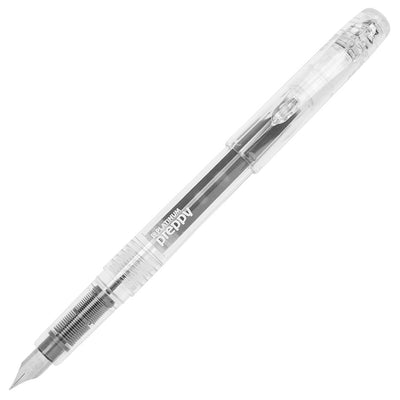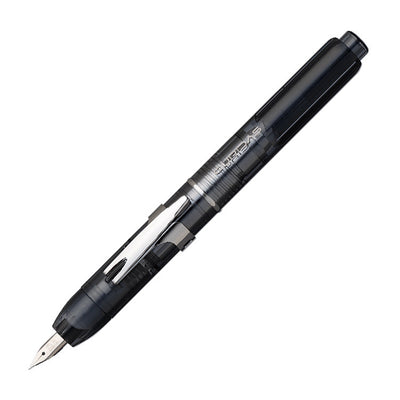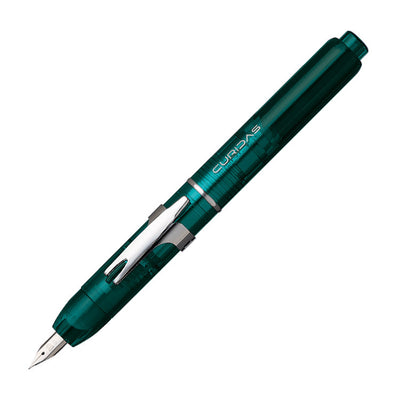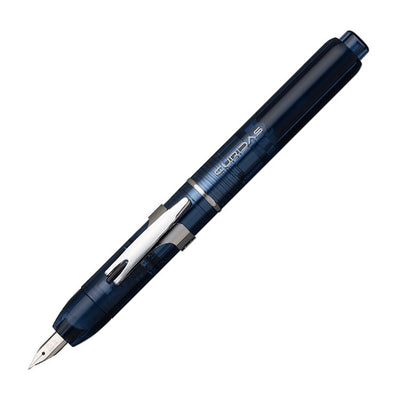 Order in
Order in
Platinum Classic Ink - Cassis Black is backordered and will ship as soon as it is back in stock.
An unusual range of inks made by a traditional Japanese method which only Platinum still use. The dark colours will change over time after the ink dries. The dry ink on the page will oxidise with exposure to the air, darkening, and becoming closer to black as time passes. The same process also makes the ink more permanent on the page - it's the same type of ink used by registrars for documents that need to stay readable for centuries - often known in the west as 'iron gall' ink. There are a handful of blue-black inks of this type available these days, but it's very rare to find a range of colours.
Acidity: inks of this type are somewhat acidic, but not to a harmful extent. People who want to leave their writing to future generations often seek out 'acid-free' paper and inks, but the inks used by registrars for important records are acidic iron gall inks. The acidity is quite low, so although it's possible for it to harm paper, it generally won't. There are documents over a thousand years old written with iron gall inks, that are still in good condition. Modern inks like these are much safer in this regard.
Safety: while Platinum don't give any specific recommendations for use of this ink, it's probably best to take a little extra care with it, and it probably isn't the best choice for a very valuable pen. 'Iron gall' inks are slightly acidic, and prolonged use can eventually damage parts of the pen. There's a higher risk of clogging than with regular dye inks, too, so it's best not to leave it in a pen that's going to be unused for some time. Modern formulations intended for fountain pens, like this Classic ink, though, are very much safer for fountain pens than traditional iron gall inks would have been, and can be used quite normally.
Orders placed before 3pm Monday to Friday will normally be sent out the same day.
UK Orders
FREE Royal Mail Standard delivery for orders over £100, and just £3.75 for smaller orders. Royal Mail Priority is available as an option, for £4.50 on orders over £100, £5.50 on smaller orders. Express available for £9.75, or FREE with any order over £400. No delivery surcharges for Northern Ireland, Highlands & Islands or anywhere else!
International
International deliveries vary in cost, so you'll need to add the items you want to your basket, and enter the checkout to see the options for delivery. Prices and payment methods will reflect your country, and many countries have all taxes and duties included to make things easier and more predictable.
Orders over 2kg
For all orders outside the UK, heavy orders may cost more to send, but the shipping cost will be displayed in the checkout before you commit.
More Information
For more, see our Delivery Information page.
- Detail
- Delivery
- Reviews
- Refills & Spares
An unusual range of inks made by a traditional Japanese method which only Platinum still use. The dark colours will change over time after the ink dries. The dry ink on the page will oxidise with exposure to the air, darkening, and becoming closer to black as time passes. The same process also makes the ink more permanent on the page - it's the same type of ink used by registrars for documents that need to stay readable for centuries - often known in the west as 'iron gall' ink. There are a handful of blue-black inks of this type available these days, but it's very rare to find a range of colours.
Acidity: inks of this type are somewhat acidic, but not to a harmful extent. People who want to leave their writing to future generations often seek out 'acid-free' paper and inks, but the inks used by registrars for important records are acidic iron gall inks. The acidity is quite low, so although it's possible for it to harm paper, it generally won't. There are documents over a thousand years old written with iron gall inks, that are still in good condition. Modern inks like these are much safer in this regard.
Safety: while Platinum don't give any specific recommendations for use of this ink, it's probably best to take a little extra care with it, and it probably isn't the best choice for a very valuable pen. 'Iron gall' inks are slightly acidic, and prolonged use can eventually damage parts of the pen. There's a higher risk of clogging than with regular dye inks, too, so it's best not to leave it in a pen that's going to be unused for some time. Modern formulations intended for fountain pens, like this Classic ink, though, are very much safer for fountain pens than traditional iron gall inks would have been, and can be used quite normally.
Orders placed before 3pm Monday to Friday will normally be sent out the same day.
UK Orders
FREE Royal Mail Standard delivery for orders over £100, and just £3.75 for smaller orders. Royal Mail Priority is available as an option, for £4.50 on orders over £100, £5.50 on smaller orders. Express available for £9.75, or FREE with any order over £400. No delivery surcharges for Northern Ireland, Highlands & Islands or anywhere else!
International
International deliveries vary in cost, so you'll need to add the items you want to your basket, and enter the checkout to see the options for delivery. Prices and payment methods will reflect your country, and many countries have all taxes and duties included to make things easier and more predictable.
Orders over 2kg
For all orders outside the UK, heavy orders may cost more to send, but the shipping cost will be displayed in the checkout before you commit.
More Information
For more, see our Delivery Information page.










